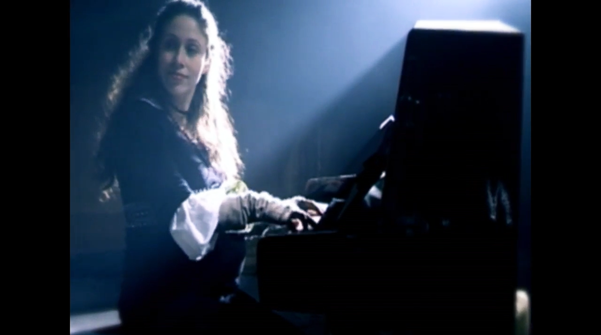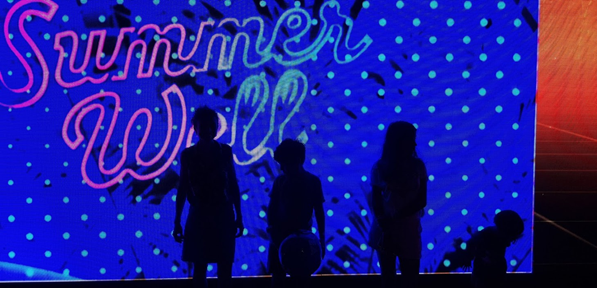When and how did you first meet music?
I was born in Bulgaria in ’80s and raised by a brave, bibliophile, critically thinking, nonconformist single mother in an analogue post-communist world where to have a TV you had to be entered in a list, wait for months for the shipment and after that spent a night in front of the only shop where they would (probably) sell you the TV set following (or not) the aforementioned list. I listened to gramophone records (the Beatles, the Queen, Louis Armstrong, Ray Charles, Elvis Presley, Grieg, dramatized tales, etc) before I have even had a television at home.
I was four when my mother brought the gramophone (there used to be a factory in Bulgaria and they were not too expensive) at our TV-less home. And I was five when she bought (on credit of course) her first piano (one made in the Soviet Union, branded as from the Belarus) – for me, because I had just been started playing and attend a music school. At the same time I was fulfilling her dream from childhood to have the instrument at home, because she had taken lessons for five years but never had one and had to go to the community center in her hometown to practice. So I started listening to music passionately and playing the piano, to read words and to read notes.

Why do you like it?
It turned out I had a talent and it was relatively easy for me to take my exams with excellence – one to become a regular student at the children music school, one to enter the professional music school after 3rd grade, another one to enter the high school and graduate with diploma from the professional music school. The logical step was the national music academy in Sofia (the capital). I studied here for five years and graduated with diploma as a classical music instrumentalist (piano player) in 2003.
During my years at the Music Academy, I listened to as much jazz music as possible and felt that if I am not gifted or brave enough to start playing jazz, there is no path in front of me as a piano player or a musician. Not that jazz was the only genre I love or admired (alternative, indie, dream pop, brit pop, post punk, soul, psychedelic and hard rock, hardcore, electronic music, IDM, film and video games soundtracks etc – I listen with pleasure and delight music in almost every genre you could think about), but I really, really dreamed to wake up one morning, sit at the piano and start improvising.
2003 was the year when I stopped playing the piano professionally. After the academy I was recording (on a midi keyboard in my home studio) parts of popular songs for a company producing a music content (ringtones, wallpapers etc) for before-the-iPhone-smartness-disrupting-the-field-mobile phones. I stayed for year and a half; and during this time I was also a singer in a club band.
In 2005 I made the transition to the world of digital media and locked the keyboard in the basement for good. What is important for the story – the first medium I was working on was an info website for (at beginning mainly underground) music and culture; I became a reporter, an editor and later an editor-in-chief following closely the music industry and writing about music – new releases, concerts, music video etc. – for more than 10 years. I also started writing about new technology and video games too.
What would you say is your biggest achievement so far?
I have played on stage with orchestra four times, for the first when I was 11. I would say that every performance on stage – alone or with other musicians – is a smaller or bigger triumph because you have only the-here-and-now to show the best of you. I can compare it with sport performance. A special mindset and many iterations in addition to some or extraordinary talent are needed both in music and in sport. A competitive spirit and perseverance are also an advantage for every player. Even the verb for doing music with an instrument and practicing sport is shared – play (in Russian too, but not in Bulgarian).
In what ways is your hobby complementary to your academic career? And are there perhaps any similarities?
After I quit playing the piano (after many movings from place to place and diminished tolerance from the owners of flats, I even do not own one anymore) I didn’t turn my back on music – just the opposite. I am consciously working on nourishing my music culture, digging for new music, following and analyzing new trends, making playlists. I also read critical reviews as if I am doing some kind of digital ethnography on what influences the new developments in the music as a cultural subject, as an industry, and as a media – new themes, new formats, new ways of fostering and growing a fan base. Also, I am interested in activism in music, the messages and influence of music artists.

Media convergence, globalization, digitalization, and the platformization of the web continue to play a fundamental role to music's production, consumption, and role in society are in the third decade of 21st century. MySpace, YouTube, and Spotify disrupted the ecology of the music industry, opening the door to niche music genres and changing the artist-fan relationship for good (Arctic Monkeys path to stardom from MySpace to seven Brit Awards and five nominations from Grammy is just one very illustrative example). And this is true to the world of sport too – just think about global TV networks as Eurosport – from the jaw-dropping cinematography and editing of live events as Roland Garros and ski jumping to the opportunity to watch on-demand even events that are not part of the main TV channels program schedules. All described is closely related and researching it is complementary to both of my academic fields – media literacy and platforms governance.
Does your hobby conflict with your academic work, such as missing deadlines or having to choose between events?
No. It is an inspiration, a pressure relief valve and a booster.
Would you recommend your hobby to other academics?
I guess that everyone’s needs for one or more activities aside from their primary occupation and obligations are unique. But at the same time, I could expect for a person who has interests in arts and entertainment will like music and cinema and enjoy going to festivals and concerts. The short answer is yes :-)!
BIO:
I am in my third year in the Media policy and law of the European Union Ph.D. program at Sofia University on a full-time basis. My research interests gravitate towards the challenges at the intersection of media, technology, and democracy focusing on platforms governance and digital rights. The list of academic publications of mine includes papers (in Bulgarian) on topics as Liability of online platforms in the EU and the US in 2020 - discourses and policies; Liability of online platforms in the context of the EU law (my Ph.D. thesis is going to be on the liability of the online platform in the EU and the UK); The growing role of the electronic media for the media literacy of the audience in the age of the information crisis; Media literacy in Bulgaria in 2020 - between media and educational policies and the civil sector; The European Parliament elections in 2019: limitations in the analysis of online media content in Bulgaria. I participated in the postponed 2020 ECREA Doctoral School (and loved it!) and I am among the participants admitted to the 2021 edition.
Image 1: A screenshot from a music video for the 2006 single of a popular at the time Bulgarian singer I played the piano in. Two months till giving birth to my oldest child :)
Image 2: Photo from Summer Well 2019 - my three music loving children and me